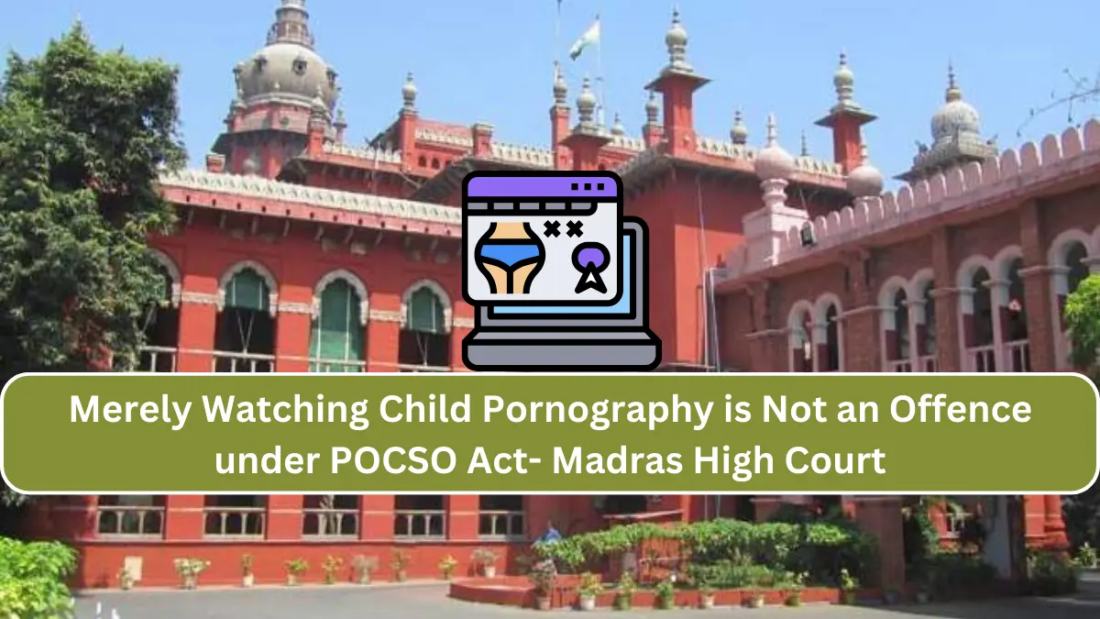Introduction: S. Harish vs. Inspector of Police and Anr. (CRL.O.P. No. 37 of 2024 and Crl.M.P. No. 79 of 2024) was decided on 11th January 2024. The Court held that merely watching pornographic photo/video in privacy would not amount to an offence under Section 14(1) of the Protection of Child from Sexual Offences Act, 2012 (hereinafter ‘POCSO’), 67-B of Information Technology Act, 2000 (hereinafter ‘IT Act’) or 292 of Indian Penal Code (hereinafter ‘IPC’). It also highlighted the growing concern of porn addiction amongst teenagers and observed that the society must advise, educate, and counsel them to get rid of the same.
Background: A letter from the Additional Deputy Commissioner of mentioned that the Petitioner had downloaded child pornographic materials on his phone. On the receipt of the same, Respondent No. 2 registered an FIR on 29.01.2020 for offences under Section 67-B of the IT Act and Section 14(1) of POCSO.
The Petitioner’s phone was seized during the investigation and sent to the Forensic Science Department whose report stated that there were two files containing child pornography content where boys (under teen) were involved in sexual activity with an adult woman/girl. This report was taken on record in Spl.SC.No. 170 of 2023 before the Sessions Judge, Mahila Neethi Mandra (Fast Track Court), Tiruvallur District. This petition is filed to quash the above pending proceedings.
Legal Provisions: Section 67-B of the IT Act provides for punishment for publishing or transmitting material depicting children in sexually explicit act, etc. in electronic form.
Section 14(1) of the POCSO provides for imprisonment for a term not less than five years and a fine and in case of subsequent conviction, seven years and a fine for using a child or children for pornographic purposes.
Section 292 of IPC provides for the sale, distribution, exhibition, etc. of obscene books, painting, representation, etc.
Submissions of the Petitioner: The Petitioner admitted that he had the habit of watching pornography during his teens, however, he has neither watched child pornography nor attempted to publicise or transmit any pornographic materials to others. He had merely downloaded and watched it in privacy. He stated that he would be seeking counselling for the addiction.
Order: The Court observed that the mobile did contain pornographic materials as stated in the report. It was downloaded and available on the Petitioner’s mobile however it was within his private domain.
The Court held that “To make out an offence under Section 14(1) of POCSO, a child or children must have been used for pornography purposes… even assuming that the accused person had watched child pornography video, that strictly will not wall within the scope of Section 14(1) …it can only be construed as a moral decay on” his part.
With regard to Section 67-B of the IT Act, the Court held that the person must publish, transmit, or create material depicting children in sexually explicit act or conduct to constitute an offence under this provision. It held “this provision does not make watching child pornography, per se, an offence under Section 67-B…”. Thus, it did not cover the accused who had merely downloaded the content on his mobile and watched it.
The HC relied on one Kerela High Court judgement that dealt with Section 292 IPC where it observed that a person watching an obscene photo or video in privacy without affecting or influencing others will not constitute an offence under Section 292 IPC.
The Madras HC observed that in today’s world, there is easy access to information including adult material on gadgets which can be attributed to the growing rise in addiction to watching porn photos/videos. Porn addiction like others can be understood through principles of “operant conditioning” where watching porn is ‘reinforced or rewarded’ by tapping into the instinctive sex drive which is easier than finding a mate and thus, leading to the making of a habit and addiction.
The Court highlighted a study by Porn Statistics in Teens which shows that “9 out of 10 boys are exposed to some form of pornography before the age of 18, 6 out of 10 girls are exposed to pornography before 18 years old, on average, a male’s first exposure to pornography is at 12 years old, 71% of teens have done something to hide what they do online from their parents, and teenage boys, 12-17 years old, have the highest risk of developing a porn addiction” making porn addiction a growing concern. This can have negative psychological and physical consequences.
Thus, the Court observed that society must advise, educate and counsel them to deal with the issue of addiction and that “the education must start from the school level”.
Conclusion: The Court advised the petitioner to take counselling to get rid of the addiction and quashed the proceedings pending before the Sessions Judge stating that “the continuation of the proceedings against the petitioner will amount to an abuse of the process of Court.”
– By Lakshita bhati
 Cart is empty
Cart is empty 

